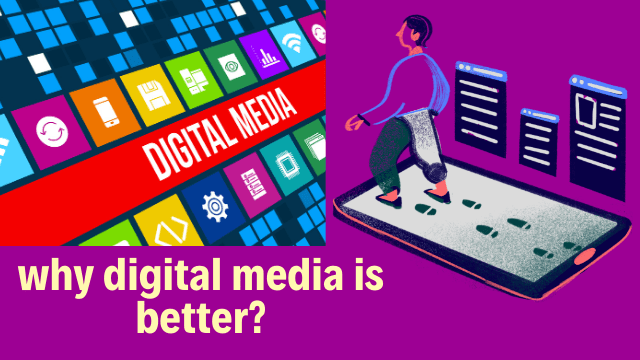Why It Outperforms Traditional Marketing
In the ever-evolving landscape of marketing, the debate between digital media and traditional advertising continues to be a topic of interest. While traditional advertising has its merits, the rise of digital media has brought about a paradigm shift in the marketing industry. This article aims to explore the power of digital media and why it outperforms traditional marketing, shedding light on its advantages and impact on modern marketing strategies.
The Evolution of Marketing Channels
The marketing landscape has witnessed a significant transformation with the emergence of digital media. Traditional advertising, encompassing TV, radio, and print, has long been the cornerstone of marketing strategies. However, the advent of digital media has revolutionized the way businesses connect with their audience. Digital marketing technologies and their ecosystems have dominated growth in marketing budgets, challenging marketers, product designers, and communicators of all stripes[2].
Advantages of Digital Media Over Traditional Marketing
- Targeted Reach: Digital media allows for precise targeting, enabling businesses to reach specific demographics, interests, and behaviors, unlike traditional advertising, which often has a broader reach.
- Measurable Impact: Digital media provides robust analytics and tracking capabilities, allowing marketers to measure the effectiveness of their campaigns in real-time, a feature lacking in traditional advertising.
- Cost-Effectiveness: Digital media offers cost-effective solutions, making it accessible to businesses of all sizes, while traditional advertising can be prohibitively expensive.
- Engagement and Interactivity: Digital media fosters two-way communication, enabling businesses to engage with their audience and build meaningful relationships, a feature that traditional advertising lacks.
Best Practices for Leveraging Digital Media
- Content Strategy: Developing a comprehensive content strategy that aligns with business goals and audience needs is crucial for leveraging digital media effectively.
- Targeted Advertising: Utilizing targeted advertising on digital platforms allows businesses to reach specific audience segments, maximizing the impact of their marketing efforts.
- Data-Driven Decision Making: Leveraging data analytics to inform marketing decisions and optimize campaigns for improved performance is a key practice in digital media marketing.
- Multi-Channel Approach: Employing a multi-channel approach to digital media marketing ensures that businesses reach their audience across various platforms, maximizing visibility and engagement.
Impact of Digital Media on Marketing Strategies
The rise of digital media has revolutionized marketing strategies, offering unparalleled opportunities for businesses to connect with their audience. It has redefined the way brands engage with consumers, providing a platform for personalized, targeted, and measurable marketing efforts. The ability to tailor content, track performance, and engage in real-time conversations has positioned digital media as a powerful force in modern marketing strategies[5].
The power of digital media in outperforming traditional marketing lies in its targeted reach, measurable impact, cost-effectiveness, and engagement capabilities. By leveraging digital media effectively, businesses can connect with their audience in a more personalized and impactful manner, driving engagement, conversions, and brand loyalty. As the marketing landscape continues to evolve, digital media stands as a testament to the transformative power of technology in shaping modern marketing strategies.
Why It Reigns Supreme in Modern Marketing
Digital media has emerged as a dominant force in modern marketing, challenging the traditional advertising landscape and revolutionizing the way businesses connect with their audience. The rise of digital media has brought about a paradigm shift, offering unparalleled opportunities for personalized, targeted, and measurable marketing efforts. This article aims to explore the reasons behind the supremacy of digital platforms over traditional media, shedding light on the advantages and impact of digital media on modern marketing strategies.
The Rise of Digital Media
Digital media has transformed the marketing landscape, providing businesses with a platform to engage with their audience in a more personalized and impactful manner. The digitization of commerce has presented a unique opportunity for companies to drive revenue and keep customers engaged. The key is to assess the whole organization, not just individual divisions or silos, to ensure that the company is on track to meet its financial goals[2].
the supremacy of digital platforms over traditional media lies in its targeted reach, measurable impact, cost-effectiveness, and engagement capabilities. By leveraging digital media effectively, businesses can connect with their audience in a more personalized and impactful manner, driving engagement, conversions, and brand loyalty. As the marketing landscape continues to evolve, digital media stands as a testament to the transformative power of technology in shaping modern marketing strategies.
Embracing Digital Media in Modern Marketing
The case for embracing digital media over traditional channels is rooted in its ability to provide targeted reach, measurable impact, cost-effectiveness, and engagement capabilities. By leveraging digital media effectively, businesses can connect with their audience in a more personalized and impactful manner, driving engagement, conversions, and brand loyalty. As the marketing landscape continues to evolve, digital media stands as a testament to the transformative power of technology in shaping modern marketing strategies.
the case for embracing digital media over traditional channels is evident in its ability to provide targeted reach, measurable impact, cost-effectiveness, and engagement capabilities. By leveraging digital media effectively, businesses can connect with their audience in a more personalized and impactful manner, driving engagement, conversions, and brand loyalty. As the marketing landscape continues to evolve, digital media stands as a testament to the transformative power of technology in shaping modern marketing strategies.

